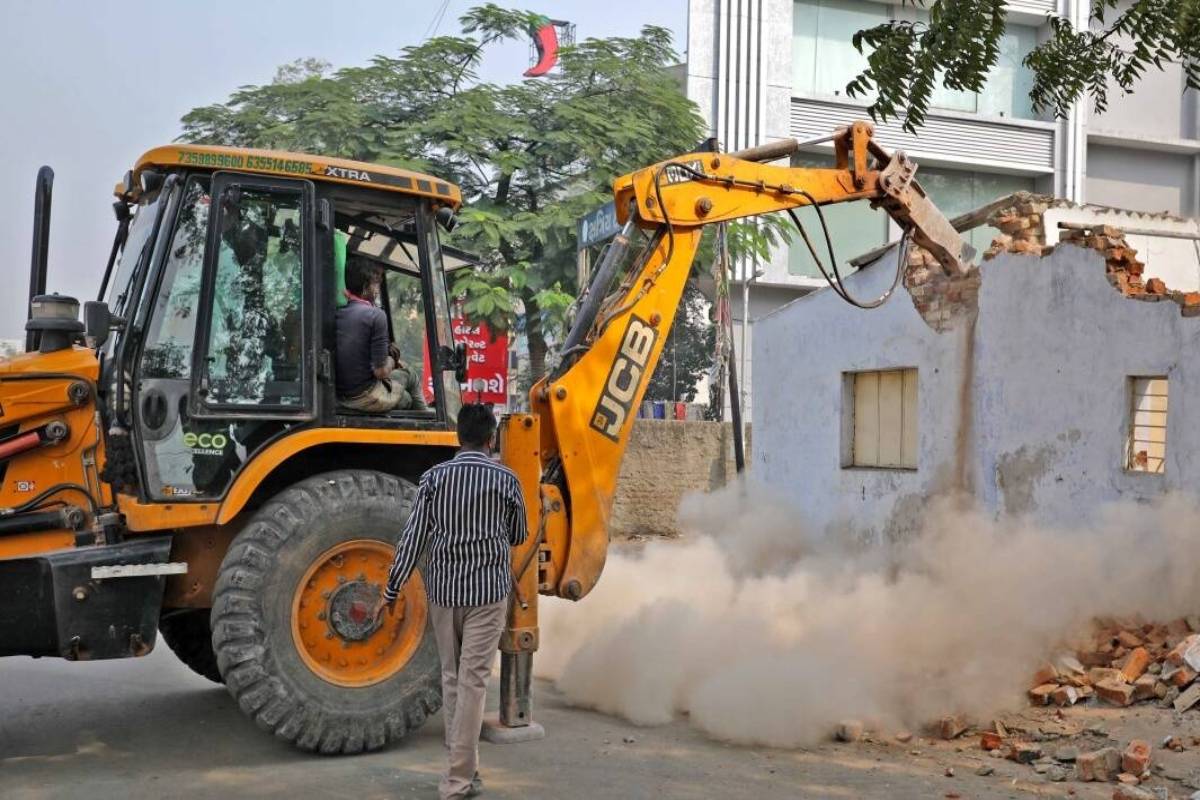SC seeks number of FIRs registered in instant triple talaq cases
Triple talaq ceased to exist on August 22, 2017, when the Supreme Court declared it void.
It termed the practice “unconstitutional, arbitrary, high-handed and violative of the rule of law, and abuse of power by the executive authorities and violative of fundamental right to life and shelter guaranteed under Article 21 of the constitution”.

Bulldozer as weapon: TRS takes a cue from BJP on fixing opponents (representational image)
In a significant judgment, the Supreme Court on Wednesday reined in “bulldozer justice” being practiced in certain states targeting the residential and commercial buildings belonging to a person allegedly in conflict with law.
It termed the practice “unconstitutional, arbitrary, high-handed and violative of the rule of law, and abuse of power by the executive authorities and violative of fundamental right to life and shelter guaranteed under Article 21 of the constitution”.
Advertisement
Laying down the guidelines that have to be strictly adhered to by the authorities while embarking on the demolition of the structures belonging to an alleged accused, a bench of Justice B.R. Gavai and Justice K.V. Viswanathan said that if the demolition is found to be in violation of the orders of the top court, “the officer/officers concerned will be held responsible for restitution of the demolished property at his/their personal cost in addition to payment of damages.”
Advertisement
The judgment in the matter titled “Re: Directions in the matter of demolition of structures” has dealt with different dimensions relating to the issue including rule of law, separation of powers, doctrine of public trust and public accountability, rights of the accused under the constitution, principles of criminal law – presumption of innocence of an accused till found guilty by a court and natural justice, right to shelter and permissibility of collective punishment on the family of an accused and the direction that have to be followed before any demotion drive is undertaken.
Stating that it is a “dream of every person, every family to have a shelter above their heads” and a house is an “embodiment of the collective hopes of a family or individuals’ stability and security”, Justice Gavai speaking for the bench said, “An important question as to whether the executive should be permitted to take away the shelter of a family or families as a measure for infliction of penalty on a person who is accused in a crime under our constitutional scheme or not arises for consideration.”
Taking a stern view of the way residential or commercial buildings are being demolished merely because an alleged accused is residing there, the judgment said, “In our view, if demolition of a house is permitted wherein number of persons of a family or a few families reside only on the ground that one person residing in such a house is either an accused or convicted in the crime, it will amount to inflicting a collective punishment on the entire family or the families residing in such structure. In our considered view, our constitutional scheme and the criminal jurisprudence would never permit the same.
Stating that the principle that “an accused is not guilty unless proven so (guilty beyond a reasonable doubt) in a court of law” is foundational to any legal system”.
Justice Gavai authoring the judgment said, “The chilling sight of a bulldozer demolishing a building, when authorities have failed to follow the basic principles of natural justice and have acted without adhering to the principle of due process, reminds one of a lawless state of affairs, where “might was right”.”
Justice Gavai further said, “In our constitution, which rests on the foundation of ‘the rule of law’, such high-handed and arbitrary actions have no place. Such excesses at the hands of the executive will have to be dealt with by the heavy hand of the law. Our constitutional ethos and values would not permit any such abuse of power and such misadventures cannot be tolerated by the court of law.”
Addressing the apprehension of the people against any arbitrary exercise of power by the officers/officials of the State, the top court issued directions that have to be strictly adhered to, the court directed that “No demolition should be carried out without a prior show cause notice returnable either in accordance with the time provided by the local municipal laws or within 15 days’ time from the date of service of such notice, whichever is later.”
Besides the issuance of the notice, the directions also mandates providing of personal hearing by the designated authority to the person to be affected by the proposed demolition, recording of the minutes of such hearing, issuance of final order, an opportunity of appellate and judicial scrutiny of the final order, and video-graphing of the demolition proceedings.
Dwelling on different aspects arising in the issue, the judgment, however, clarified that these directions will not be applicable if there is an unauthorized structure in any public place such as road, street, footpath, abutting railway line or any river body or water bodies and also to cases where there is an order for demolition made by a Court of law.
Posting the matter for further orders after four weeks, the top court directed that the Collector/District Magistrate shall designate a nodal officer and also assign an email address and communicate the same to all the municipal and other authorities in charge of building regulations and demolition within one month from today.
The court directed its Registrar (Judicial) to circulate a copy of the judgment to the Chief Secretaries of all the States/Union Territories and the Registrar Generals of all the High Courts. All State Governments shall issue circulars to all the District Magistrates and local authorities intimating them about the directions issued by top Court.
Advertisement